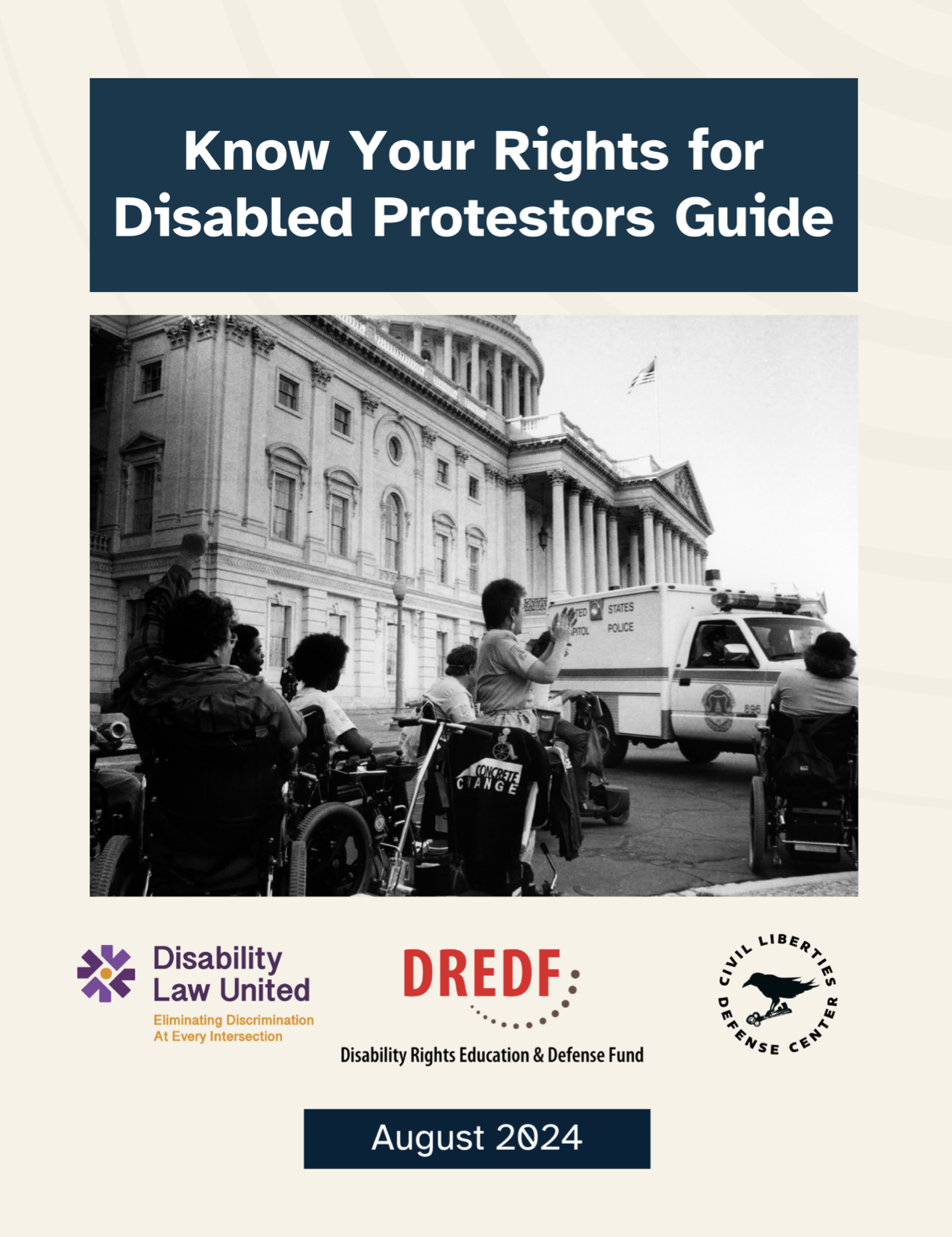Disability Community
Nothing About Us Without Us
Seattle Special Education PTSA (SSEPTSA)
In Region 6 of the Washington State PTA and within the Seattle Council PTSA, SSEPTSA:
Advocates for neurodivergent and disabled students with or without IEPs or 504 Plans within Seattle Public Schools and their families, educators, and the community.
Empowers families by guiding them through the education system, supporting informed decision‑making, and collaborating with partners to expand access to resources.
Drives systemic change toward equity and inclusion by challenging discriminatory policies, practices, and narratives, particularly those harming students of color with disabilities. This includes upholding IDEA, Section 504, and ADA law.
Guide to Special Education
Getting to Results: A Guide to Special Education in Seattle Public Schools is a free guide for families, caregivers, and educators in Seattle Public School district created by the Seattle Special Education PTSA. The Guide has been translated into ten language to better serve more families in Seattle. Seattle Special Education PTSA accepts donations to support updates and translation costs.
Español | Tiẽng Việt | 简体中文 | Tagalog | عربى | አማርኛ | Afaan Oromoo | Somaliyeed | ትግርኛ
Washington State Government Support
Office of the Superintendent of Public Instruction (OSPI)
OSPI provides students and families with information about special education, to ensuring that students and families know about their rights and answering questions they may have about how the process works. Approximately 143,000 eligible students in Washington state receive special education and related services. OSPI fulfills the requirements of the federal Individuals with Disabilities Education Act (IDEA), which ensures all children with disabilities have access to a free appropriate public education.
Office of the Education Ombuds (OEO)
The Washington State Governor’s Office of the Education Ombuds works to address problems collaboratively so that every student can fully participate and thrive in Washington’s K-12 public schools. Services are available to families, students, educators, community professionals and others with questions or concerns affecting any child who attends or is eligible to attend Washington State's k-12 public schools.
Parent and Student Rights (Procedural Safeguards)
The Individuals with Disabilities Education Act (IDEA) requires schools to provide the parents/guardians of a student who is eligible for or referred for special education with a notice containing a full explanation of the rights available to them.
Notice of Special Education Procedural Safeguards
Amharic | Arabic | Bosnian | Burmese | Chinese (Simplified) | Chuukese | Dari | French | Haitian Creole | Hakha Chin | Hindi | Japanese | Khmer (Cambodian) | Korean | Lao | Marshallese | Nepali | Pashto | Portuguese | Punjabi | Russian | Samoan | Somali | Spanish | Tagalog | Thai | Tigrinya | Ukrainian | Vietnamese
Extended Myths & Facts About Inclusionary Practices in Washington busts common myths about inclusion using decades of research that consistently show robust benefits from inclusionary practices and challenges misconceptions about inclusion, emphasizes the benefits of inclusive education for all students, and supports educators with strategies to overcome barriers.
The University of Washington
Haring Center
The University of Washington Haring Center for Inclusive Education provides early childhood education to children with and without disabilities, conducts leading-edge research to advance inclusive learning, and trains education professionals in proven practices to develop every child’s potential.
TIES Center
TIES Center works with states, districts, and schools to support the movement of students with disabilities from less inclusive to more inclusive environments. Inclusion is an ongoing commitment to working for the valued membership, active participation, and learning of each student with their age-grade peers, utilizing a wide array of school community structures, practices, and supports.
Guide to Comprehensive Inclusive Education
Comprehensive Inclusive Education: General Education & the Inclusive IEP supports the creation and provision of a curricular and instructional program based on the acknowledgment that:
each child is a general education student.
the general education curriculum and routines and the Individualized Education Program (IEP) comprise a student’s full educational program.
the IEP for a student qualifying for special education services is not the student’s curriculum.
Community Support
Multicultural Support
Open Doors for Multicultural Families
Supports disability, cultural understanding, and community empowermentThe Arc of King County
Promotes and protects the rights of people with intellectual and developmental disabilitiesWashington Multicultural Service Link
Empowers and provides high-quality support services to African diaspora and African-American Families, individuals with disabilities, and those with special healthcare needsSomali Health Board
Reduces health disparities for immigrants and refugees within King CountySouth King County Discipline Coalition
Aims to Abolish the School to Prison Pipeline through supporting Family leadership and advocacy
Legal Support
Disability Rights Washington
Protects the rights of people with disabilities statewideNorthwest Justice Project
Provides FREE legal assistance for low-income individuals, families and communities across Washington StateTeam Child
Provides FREE legal services and advocates for youth education
General Support
Pave
Provides support, training, information and resources to empower and give voice to individuals, youth and families impacted by disabilities in Washington
Specific Disability Support
Autistic Self Advocacy Network
Works to make our society more inclusive for autistic people. We work to make sure that autistic people are in control in our own lives, and have a say in policies that affect us.Decoding Dyslexia, Washington
Raises awareness, empowers parents, and informs policy makers about dyslexiaReading Equity Project
Expands access to structured LiteracyWashington Autism Alliance
expands access to healthcare, education and services for people with autism and other intellectual and developmental disabilities in Washington StateWashington State Hands and Voices
Dedicated to supporting families with children who are Deaf or Hard of Hearing (DHH) regardless of language or communication mode
Seattle Public Schools・Civic Engagement Activity Excused Absence Form
Advocacy
Disability Rights Education and Defense Fund (DREDF) Founded in 1979, is a leading national civil rights law and policy center directed by individuals with disabilities and parents who have children with disabilities.
The American Civil Liberties Union (ACLU) supports equal access to educational opportunities for people with disabilities. The ACLU is also committed to challenging the “school-to-prison pipeline,” a disturbing national trend wherein children are funneled out of public schools and into the juvenile and criminal justice systems. Students with disabilities and students of color with disabilities are disproportionately targeted by school police. They would benefit from support by much-needed mental health staff—counselors, social workers, and school psychologists. Instead, they are isolated, punished, and pushed out. ACLU promote an education system that is free from school policing and punitive disciplinary methods—such as corporal punishment, restraint and seclusion, and bullying—and inappropriate and overused suspensions and expulsions. We oppose the use of vouchers and separate schools that further segregate and impoverish the education of students with disabilities.
Guides
Stimpunks Foundation
Stimpunks is a radically inclusive space led by and for neurodivergent and disabled people. Blending mutual aid, community care, and educational resources, we reimagine learning, working, and living through the lens of neurodiversity, disability justice, and lived experience. Our site offers rich content on neurodivergent design, sensory access, monotropism, and noncompliant pedagogy—centering voices that move through the world differently and advocating for systems rooted in access intimacy, creativity, and interdependence.
10 Principles 0f Disability Justice
INTERSECTIONALITY “We do not live single issue lives” –Audre Lorde. Ableism, coupled with white supremacy, supported by capitalism, underscored by heteropatriarchy, has rendered the vast majority of the world “invalid.”
LEADERSHIP OF THOSE MOST IMPACTED “We are led by those who most know these systems.” –Aurora Levins Morales
ANTI-CAPITALIST POLITIC In an economy that sees land and humans as components of profit, we are anti-capitalist by the nature of having non-conforming body/minds.
COMMITMENT TO CROSS-MOVEMENT ORGANIZING Shifting how social justice movements understand disability and contextualize ableism, disability justice lends itself to politics of alliance.
RECOGNIZING WHOLENESS People have inherent worth outside of commodity relations and capitalist notions of productivity. Each person is full of history and life experience.
SUSTAINABILITY We pace ourselves, individually and collectively, to be sustained long term. Our embodied experiences guide us toward ongoing justice and liberation.
COMMITMENT TO CROSS-DISABILITY SOLIDARITY We honor the insights and participation of all of our community members, knowing that isolation undermines collective liberation.
INTERDEPENDENCE We meet each others’ needs as we build toward liberation, knowing that state solutions inevitably extend into further control over lives.
COLLECTIVE ACCESS As brown, black and queer-bodied disabled people we bring flexibility and creative nuance that go beyond able-bodied/minded normativity, to be in community with each other.
COLLECTIVE LIBERATION No body or mind can be left behind – only moving together can we accomplish the revolution we require.



